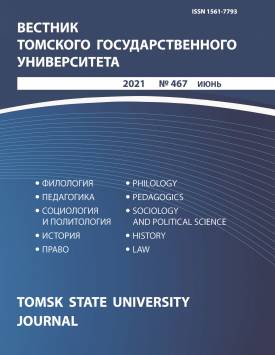Teachers’ and Graduates’ Influence on the Formation of Students’ Views on Foreign Language Needs in Their Professional Activities
The present article reports on a study conducted at the National Research University Higher School of Economics (NRU HSE). The study aims to find new ways to design and implement efficient practice-oriented foreign language courses which would comply with these requirements and meet specific workplace demands. Rethinking the factors which shape students’ motivation based on their understanding of learning goals is considered as one of the ways to increase learning effectiveness. The research aim is to provide comparative analysis of students’ perception of learning needs, their instructors’ vision of learning needs, and perceived needs of the employed NRU HSE graduates. The second aim is to understand to what extent teachers and graduates may influence students’ views on learning as a process that comply with their potential foreign language needs at workplace. The data were drawn from 184 questionnaires. The survey items were adopted from the questionnaires in Taillefer’s (2006) study and the QALSPELL project (2005), a part of the European Commission program. Participants of this study consisted of the following groups: 1st-, 3rd- and 4th-year non-language major students of 2019-2020; their foreign language instructors; and employed graduates of 2013-2019. The cluster random sampling procedure in the amount of 30% of the total number of students per year of study and the snowball method and convenience sampling were used for the graduates and instructors respectively to select the participants. The data from the completed questionnaires on four language skills, the context of both current foreign language education programs and the use of a foreign language at the workplace were analyzed. One-way ANOVA, Tukey’s (HSD), and Bonferroni and Holm’s post hoc tests were performed to assess the significance of group means difference and control error rates. The findings indicate the difference in the weight the groups ascribe to the four foreign language skills: students largely underestimate the importance of reading and writing in the workplace. Moreover, the students’ and foreign language instructors’ perceptions of professional context for foreign language use deviate from those of the graduates. The differences concern the frequency of using foreign language as well as national and cultural environment. Finally, the students’ perception of their language needs change with the year of study. Thus, the analysis revealed the dynamic character of students’ motivational self-regulation under the influence of such explicit active factors as the instructors’ views on the teaching context and its effectiveness, the graduates’ real needs at the working place, and the students’ perception of their future professional language needs to be met and reflected in the course of teaching. The findings are discussed in light of their practical implications for designing, implementing, and aligning of foreign language courses to meet workplace demand.
Keywords
teaching foreign languages for special purposes, motivation to study ESP, factors of motivation formation, professional foreign language contextAuthors
| Name | Organization | |
| Yakusheva Irina V. | Higher School of Economics | iyakusheva@hse.ru |
| Marina Olga A. | Higher School of Economics | omarina@hse.ru |
| Demchenkova Oksana A. | Higher School of Economics | odemchenkova@hse.ru |
References

Teachers’ and Graduates’ Influence on the Formation of Students’ Views on Foreign Language Needs in Their Professional Activities | Vestnik Tomskogo gosudarstvennogo universiteta – Tomsk State University Journal. 2021. № 467. DOI: 10.17223/15617793/467/12
